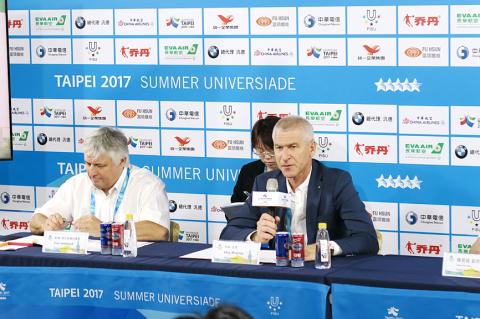International University Sports Federation (FISU) president Oleg Matytsin yesterday said the term “Chinese Taipei” has been used for Taiwan’s Taipei Summer Universiade teams because the federation must conform to the International Olympic Committee’s (IOC) Olympic Movement rules.
Matytsin made the remark at a news conference in Taipei yesterday, a few hours before the Universiade opening ceremony.
He said that delegations from 141 countries, including 7,746 athletes and 3,796 support staff, would be attending the Universiade this year.

Photo: CNA
As of Friday, 119 delegations, including 5,477 athletes and 2,619 support staff, had arrived.
The official Universiade media guide had used “Chinese Taipei,” but later changed it to “Taiwan” after legislators and the public expressed their discontent.
Earlier this month, the Universiade Organizing Committee said that the term “Chinese Taipei” was changed by the federation during a content review, but the committee changed it back to “Taiwan” in the geographical introduction section of the guide, and informed the federation.
Yesterday, Matytsin said the media guide was not “corrected” and the change to “Taiwan” was decided on to introduce the country and its outlying islands.
The federation is an IOC-recognized organization, so it has to conform to the Olympic Movement rules and regulations, he said, adding that he knows many people are disappointed about using “Chinese Taipei,” but the rules must be followed. The flag and team logo must remain as “Chinese Taipei.”
“Respect the rules,” Matytsin said. “Today, I believe it’s very important to educate people how to play according to the rules.”
Matytsin said Taipei has provided high-quality accommodation to athletes and support staff from around the world, and the passion and hospitality shown in Taipei are considered gold-medal standard.
For the young athletes attending the Universiade it will be a positive experience and they will likely remember Taipei if they go on to become leaders in sports, business or politics, he said.

Tropical Storm Gaemi strengthened into a typhoon at 2pm yesterday, and could make landfall in Yilan County tomorrow, the Central Weather Administration (CWA) said yesterday. The agency was scheduled to issue a sea warning at 11:30pm yesterday, and could issue a land warning later today. Gaemi was moving north-northwest at 4kph, carrying maximum sustained winds near its center of up to 118.8kph and gusts of 154.8kph. The circumference is forecast to reach eastern Taiwan tomorrow morning, with the center making landfall in Yilan County later that night before departing from the north coast, CWA weather forecaster Kuan Shin-ping (官欣平) said yesterday. Uncertainty remains and

SEA WARNING LIKELY: The storm, named Gaemi, could become a moderate typhoon on Wednesday or Thursday, with the Taipei City Government preparing for flooding A tropical depression east of the Philippines developed into a tropical storm named Gaemi at 2pm yesterday, and was moving toward eastern Taiwan, the Central Weather Administration (CWA) said. Gaemi could begin to affect Taiwan proper on Tuesday, lasting until Friday, and could develop into a moderate typhoon on Wednesday or Thursday, it said. A sea warning for Gaemi could be issued as early as Tuesday morning, it added. Gaemi, the third tropical storm in the Pacific Ocean this typhoon season, is projected to begin moving northwest today, and be closest to Taiwan on Wednesday or Thursday, the agency said. Today, there would likely

DISRUPTIONS: The high-speed rail is to operate as normal, while several airlines either canceled flights or announced early departures or late arrivals Schools and offices in 15 cities and counties are to be closed today due to Typhoon Gaemi, local governments announced last night. The 15 are: Taipei, New Taipei City, Taoyuan, Tainan, Keelung, Hsinchu and Kaohsiung, as well as Yilan, Hualien, Hsinchu, Miaoli, Chiayi, Pingtung, Penghu and Lienchiang counties. People should brace for torrential rainfall brought by the storm, with its center forecast to make landfall on the east coast between tonight and tomorrow morning, the Central Weather Administration (CWA) said. The agency issued a sea warning for the typhoon at 11:30pm on Monday, followed by a land warning at 11:30am yesterday. As of

CASUALTY: A 70-year-old woman was killed by a falling tree in Kaohsiung as the premier warned all government agencies to remain on high alert for the next 24 hours Schools and offices nationwide are to be closed for a second day today as Typhoon Gaemi crosses over the nation, bringing torrential rain and whipping winds. Gaemi was forecast to make landfall late last night. From Tuesday night, its outer band brought substantial rainfall and strong winds to the nation. As of 6:15pm last night, the typhoon’s center was 20km southeast of Hualien County, Central Weather Administration (CWA) data showed. It was moving at 19kph and had a radius of 250km. As of 3pm yesterday, one woman had died, while 58 people were injured, the Central Emergency Operation Center said. The 70-year-old